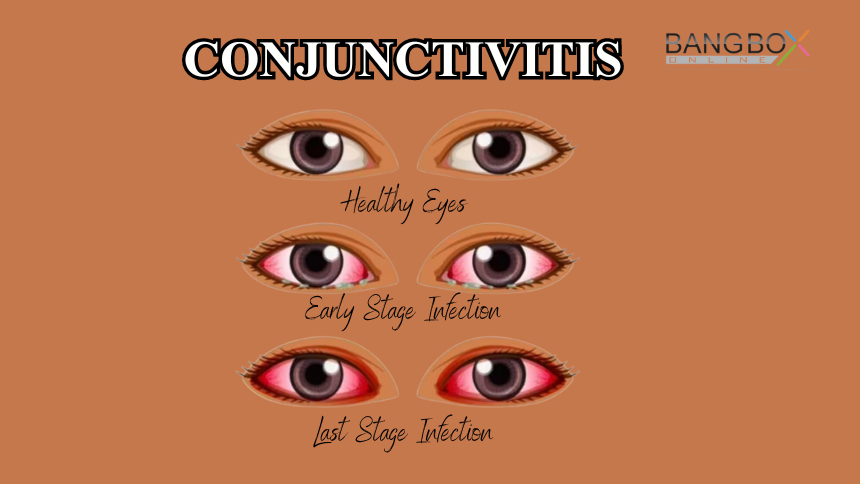
CONJUNCTIVITIS
conjunctivitis is an eye flu that affects the eyes turning them pink.
Conjunctivitis is an inflammation in the eye's outer layer, normally known as Pink Eyes, including the eyelids. This may result in a Pinky appearance of the white part of the eye and sometimes it causes burning, irritation, or pain. Conjunctivitis may affect both eyes and may cause enhanced tear production, especially in the morning. In newborn baby, this condition is characterized as Neonatal conjunctivitis and need proper treatment.
CAUSES OF CONJUNCTIVITIS:
Conjunctivitis may be caused by some allergy, dryness, viral or even bacterial infection. Viral or bacterial infection is the most common cause of this and can easily be spread in a population. Somehow, allergies specifically to animal hairs and pollens may also cause conjunctivitis.
Viral Infection:
There are three basic kinds of conjunctivitis caused by various viruses; 1. Adenoviral Keratoconjunctivitis, caused by Adenoviruses, is the most common type of conjunctivitis. 2. Herpetic Keratoconjunctivitis, caused by Herpes Simplex Viruses, is the most serious type of conjunctivitis and needs to be treated properly. 3. Acute Hemorrhagic conjunctivitis, caused by either Enteroviruses or Coxsackievirus, is the most contagious type of conjunctivitis.
Bacterial Infection:
Acute bacterial conjunctivitis is caused by three main types of bacteria; 1. Staphylococcus aureus 2. Streptococcus pneumoniae 3. Haemophilus influenzae Neisseria meningitidis or Neisseria gonorrhoeae rarely causes this disease. While infections lasting more than a week may be caused by Moraxella lacunata.
Allergic conjunctivitis:
Any allergen including pollen, smoke, cosmetics, dust, or eye drops can cause conjunctivitis. It is the most common cause of conjunctivitis among the population.
Other causes:
Other causes for conjunctivitis may include Computer vision syndrome, Dry eye syndrome, or Reactive arthritis (which is an autoimmune reaction).
SYMPTOMS:
Pink eyes, eye burning, pain followed by the itchiness. Although viral infection may lead to some other symptoms such as sore throat. Conjunctiva may also swell and extremely watery eyes can be also a symptom. Bacterial infections can be characterized by sticky eyes as it is caused by pus-producing bacteria.
DIAGNOSIS:
Most of the diagnosis is signs and symptoms based. But in a few cases, on the doctor's recommendation, a discharge sample can be used for culturing.
DURATION:
Conjunctivitis can prolong 1 to 2 weeks maximum. But in some cases, including serious infections, it can last more than a week. If the person faces visual loss or signs of herpes after a week, must be properly diagnosed and treated.
PRECAUTIONS:
Avoid close contact with the person suffering from conjunctivitis. Try to maintain good hygiene by washing your hands repeatedly. Avoid touching your eyes again and again and if irritated, use eye drops. Moreover, vaccines against viruses or bacteria causing conjunctivitis can also prevent the infection. For Neonatal conjunctivitis, Povidone-iodine eye drops are a good solution to prevent it.
TREATMENT:
Conjunctivitis is treated according to the cause of it. In the case of viral or bacterial infection, there’s no particular treatment prescribed. But antibiotics can help to recover a bit faster. Those who wear contact lenses for longer periods, get infection because of Chlamydia or may be Gonorrhea. Such cases should be treated properly. In allergic cases, eye drops having Mast cell inhibitors or Antihistamines can be a good treatment.
Eye Drops:
Various eye drop solutions can help prevent or treat conjunctivitis. They can also help to relieve pain or eye burning. Following eye drops are normally prescribed as a treatment for conjunctivitis; 1. Moxifloxacin 2. Levofloxacin 3. Ciprofloxacin 4. Ofloxacin
Vaccines:
There’s no particular vaccine that can help prevent each type of conjunctivitis. But some vaccines can prevent the associated infections; - Measles - Shingles - Pneumococcal - Haemophilus influenzae - Rubella - Chickenpox Although conjunctivitis caused by irritants or allergens is not contagious, bacterial or viral infections are highly contagious.


Create Your Online Cricket ID and Experience the Thrill of the Game
Dive into the action with CricketidOnline247! Create your Online Cricket ID today and unlo...

